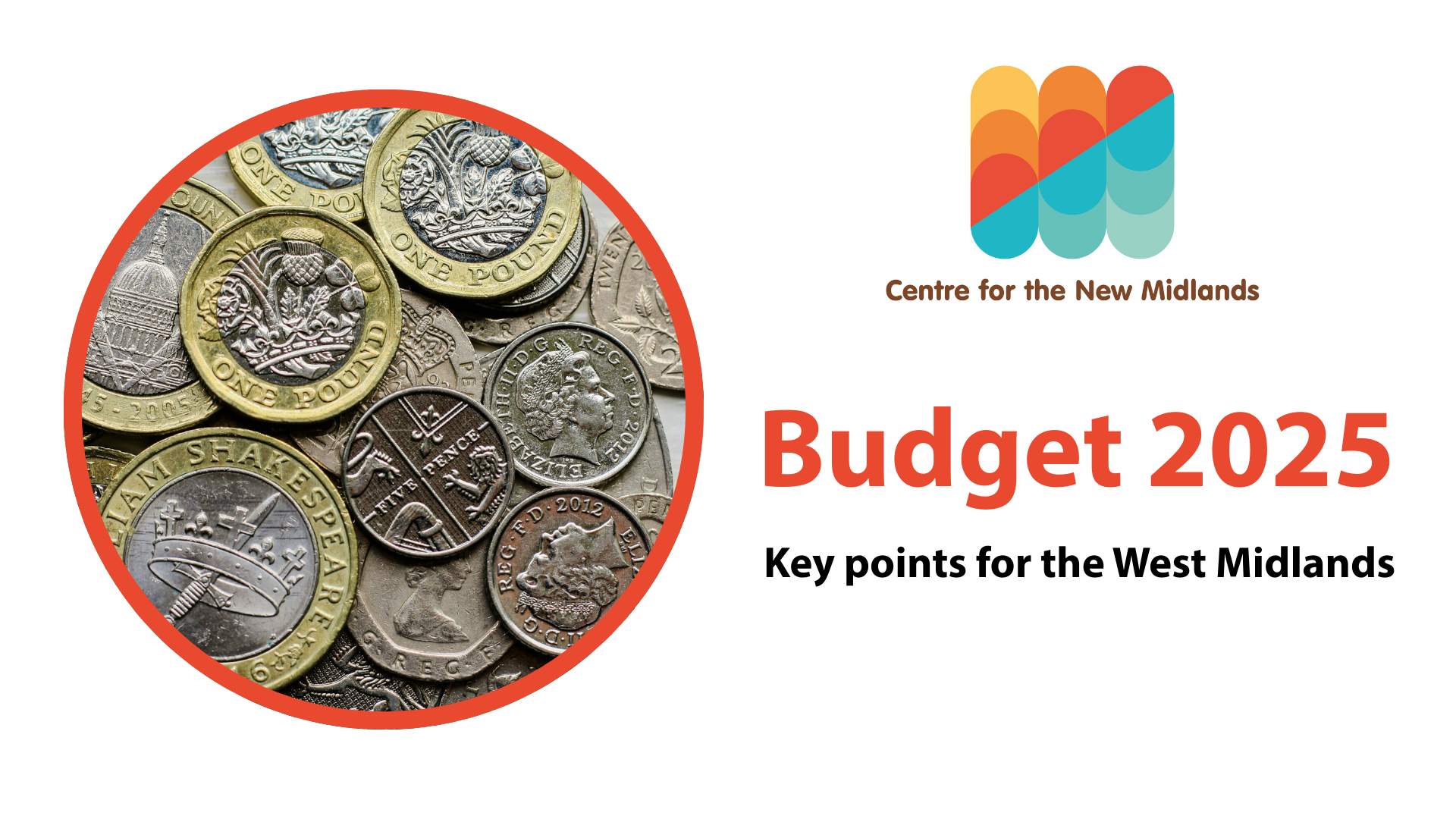In a series of personal reflections on Budget 2024, here are some thoughts from Beverley Nielsen (Research Associate, Centre for the New Midlands) on the first Budget delivered by the new Labour government.
(October 2024)
Promoting investment topped the agenda as the Chancellor sought to restore economic stability in the first Labour budget in 14 years and the first by a female Chancellor. Whatever government was in power there would have been some tough decisions to make. This government invested in public services, presenting business opportunity and starting to fix the foundations.
£100bn capital spending was announced with departmental capital spending limits increasing by 3% on average each year to 2030 with an almost 10% real terms increase of £13bn next year. This includes Over £25.6 billion of new funding to deliver an extra two million NHS operations, scans and appointments a year, reducing waiting times; £1.4 billion to rebuild 500 schools to deliver classrooms that children can learn and thrive in; £500 million to fix local roads and fill in an additional one million potholes a year.
£5bn was included to deliver on the government’s ambitious housing plans, a 19% increase to the Department for Education or £6.7bn next year and £3.1bn increase in NHS spend.
Office of Budget Responsibility (OBR) growth forecasts indicate consistent ‘stable’ growth rates over the next five years of between 1.5-2% from 2025, and perhaps even more encouraging, the outlook for inflation never exceeds more than 2.6% and falls to 2% by 2029.
This must come as a relief for households after experiencing the shocks of 11% inflation in 2022 on their family budgets. The cost-of-living crisis was clearly recognised with moves including a rise in the National Minimum wage to £12.21 per hour, with a single adult rate for 18–20-year-olds of £10 per hour, a Carer’s Allowance increase, a £1bn increase in the Household Support fund with more than 1m of the poorest households gaining £420 a year in universal credit changes. A freeze on fuel duty and a penny off a pint also lightened the mood.
In regional terms, government stressed its focus on working to develop Local Growth Plans with the devolved administrations, promoting the new Modern Industrial strategy, an innovation agenda along with funding for the skills required to drive these plans.
Increases to Employers National Insurance have been well trailed, so much so that the Speaker complained to the Chancellor about the coverage in the press made ahead of her budget statement made to the House. However, these trails are understandable given the possible impact of any budget on markets and the City. It’s hard to see, post Liz Truss, how any Chancellor wouldn’t let the City know of their plans in some convincing detail.
With a £40bn tax hike announced, the increase in Employers NI represented the single biggest tax chunk of this package, raising £25bn a year by the end of the forecast period, with these contributions increasing for employers from 13.8% to 15% from April 2025. In addition, there was a reduction announced to the secondary threshold, the level when employers start paying NI on an employee’s salary, with this lowered from £9,100, to £5,000.
Of the 5.5m businesses in the UK, the smallest businesses were afforded protection through the employment allowance, which was increased from £5,000 to £10,500. As a result, 865,000 employers, or around a sixth, won’t pay any National Insurance next year and that over one million will pay the same or less as previously. The Chancellor stressed this meant businesses employing 4 workers on a National Living Wage could do so without paying Employers NI.
On Business Rates, high street premises are saved from the cliff edge which anticipated a quadrupling in rates, for retail, hospitality and the leisure industry with a 40% discount relief up to a cap of £110,000 per business proposed in 2025/26. So, there’s relief and whilst still challenging it’s not nearly as bad as it would have otherwise been. With the economy looking up, high street businesses will, in turn, be looking to consumers to start spending more in the run up to Christmas after months of holding back.
The budget statement stressed the importance of the upcoming English Devolution White Paper and introduced the first integrated settlements from 2025-26, very much welcomed in the West Midlands and Greater Manchester. These will provide single flexible pot funding for leadership to decide how they’re spent via a single outcomes framework. In addition, the East Midlands Investment Zone was approved, aimed at driving growth in green industries and manufacturing.
There was encouraging news for the West Midlands with the Modern Industrial Strategy gaining £1bn investment for aerospace, £2bn to support EVs manufacturing and sales, £520m for life sciences and with £20bn R&D funding protected, together with the West Midlands Accelerator. Encouraging even for manufacturers outside the combined authority footprint, including Worcestershire with its emphasis on manufacturing supporting clean energy, high tech and transport.
Enabling local authorities to retain full receipts from Right to Buy sales has been welcomed by Birmingham City Council which has seen the most sales through Right to Buy (RTB) of any authority, selling 651 homes this way during 2021-22. The Council noted on the positive side this would allow them to extend existing investment plans with Cllr Sharon Thompson, Cabinet member for Housing, suggesting that government should consider providing a longer-term deal to local authorities on RTB funds retention, given the housing crisis. This would give authorities the chance to replace social homes lost through RTB and should be accompanied by the need greater flexibility in how RTB receipts are spent, so authorities can target these to where they’re most needed.
The West Midlands will be pleased and relieved to hear of the start of tunnelling for HS2’s link from Old Oak Common to London Euston. This investment, once completed, will certainly assist transport between Birmingham and the capital, important in light of current capacity constraints.
An additional £500 million for local road maintenance was announced for 2025-26 and particularly notable was the announcement of £1.3bn to improve connectivity, so important to driving productivity, including the Brierley Hill Metro extension. This is relevant to Pre Metro Operations Limited, operators of the Stourbridge ‘dasher’, which, over the last fifteen years working as the smallest train operating company in the country, has carried over 7m passengers with a 99.6% reliability track record – one of the highest on record, with plans to extend their highly successful dasher to link into the new metro line at Canal Street near North Brierley Hill connecting the smaller 57k population town of Stourbridge via this turn-up-and-go very light rail link, straight into the heart of the Black Country, the Merry Hill shopping complex, and beyond.
For Worcestershire, noted by the Chancellor in pre-budget comments as being amongst new town exemplars, including Worcestershire Parkway anticipating around 10,000 new homes with references to Liverpool and Cambridge and Sutton Coldfield, it was sad to see no further reference included in the budget and no moves being made here to reach out to the New Towns Task Force chaired by Sir Michael Lyons, a former CEO of Birmingham City Council between 1994 and 2001. Neither has there been any moves to take advantage of the government’s enthusiasm for devolution with additional powers and funds for local places. Despite the advantages which combined authorities are now enjoying in terms of investment zones, new funding and powers, according to a recent article in the Local Government Chronicle (7th October 2024) Worcestershire is the only county in England that has so far expressed ‘no interest’ in devolution.
This is a personal blog post. Any opinions, findings, and conclusion or recommendations expressed in this article are those of the authors and do not necessarily reflect the view of the Centre for the New Midlands or any of our associated organisations/individuals.
ABOUT OUR AUTHOR:
Beverley Nielsen is a Councillor (Labour Party and Co-operative) serving on Malvern Hills District and Worcestershire County Councils. She has written widely publishing books, articles and commenting in the press on a range of topics covering economics, politics and industrial policy. Beverley has proudly supported the Centre for the New Midlands since its foundation and spent the past sixteen years at Birmingham City University as part of the Centre for Brexit Studies and as Executive Director at the Institute for Design, Economic Acceleration and Sustainability (IDEAS), a think tank at the University.
Her books have covered diverse themes including Redesigning Manufacturing, Brexit Negotiations, English Regions After Brexit, Exploring the Green Economy, Green Manufacturing, Examining Net Zero, and India at 75 with her latest book on the environment due out in late 2024. For the past decade Beverley has conducted economic analysis covering a wide range of specialised industrial clusters across the East and West Midlands.
She was recently recognised as the West Midlands Outstanding Woman in STEM, 2024, and has served as an Expert Commissioner on the All-Party Manufacturing Group at the House of Commons, working for many years at the CBI in London, Brussels, Manchester and Birmingham. As a councillor in Worcestershire, she has held Economic Development and Environment portfolios with a focus on supporting local businesses, innovation and entrepreneurship having started community companies in outdoor activities and sustainable transport. Whilst working in industry, she was a Director of Aga Rangemaster plc and MD of Fired Earth.








